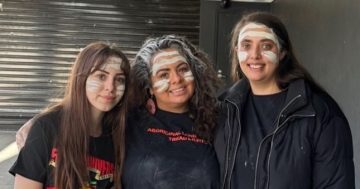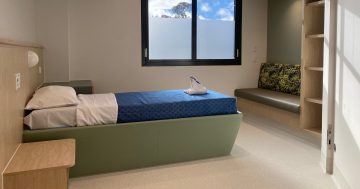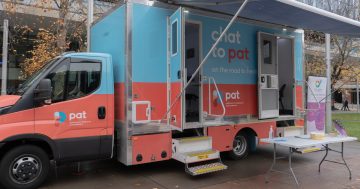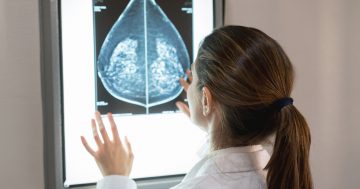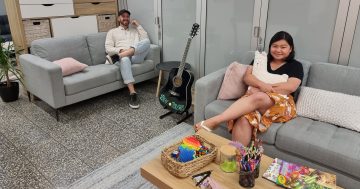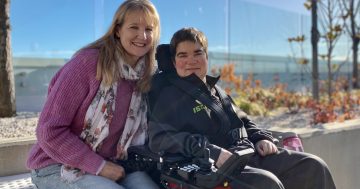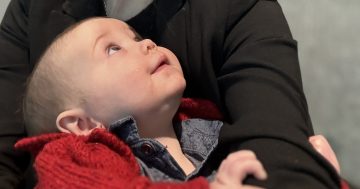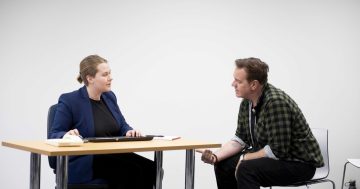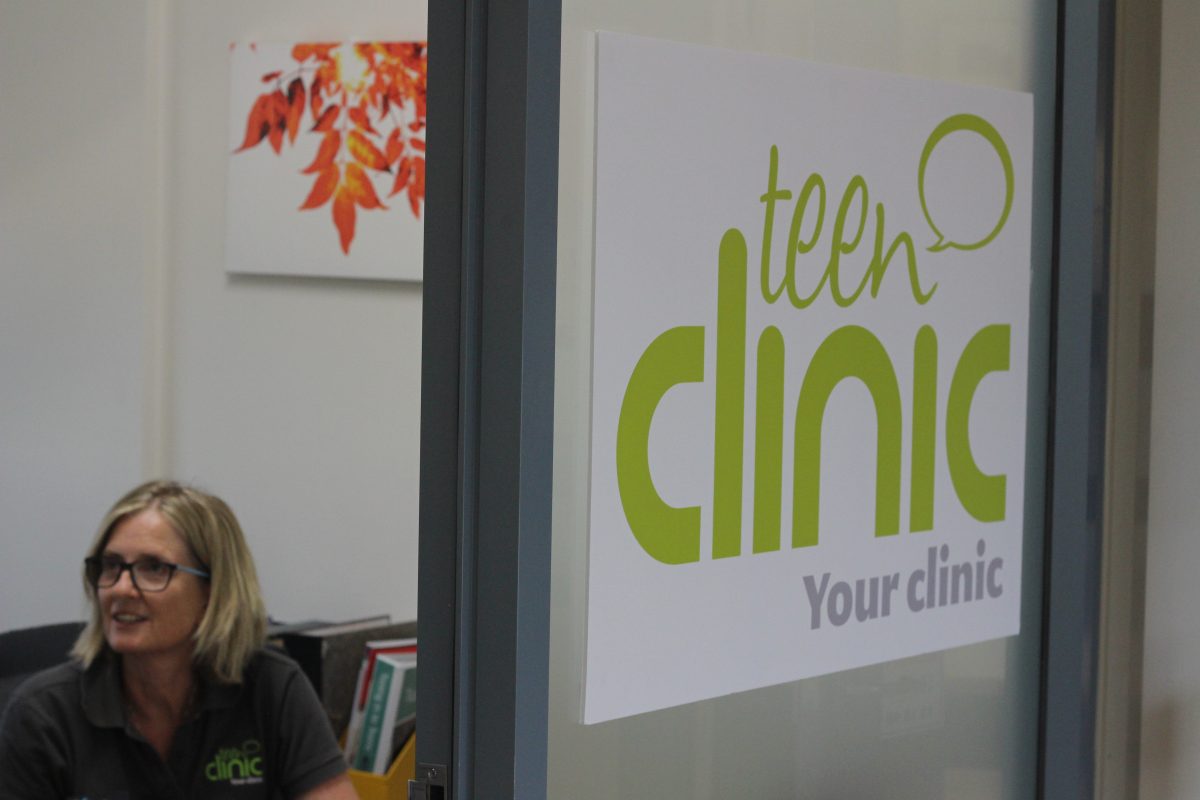
Advanced practice nurse Sandy Lendrum in the Teen Clinic office at the YWCA Canberra Mura Lanyon Youth and Community Centre. Photos: Directions Health.
Mental health issues, contraception, gender concerns, mystery rashes. It’s a wide range of health matters from a diverse group of young people but with a common theme – the need for a safe space to seek help.
Since day one, term one this year, Teen Clinic at the YWCA Canberra Mura Lanyon Youth and Community Centre has been helping young people who might otherwise not see a doctor receive the treatment or counselling they need.
The nurse-run clinic is based on the successful Teen Clinic model in Bega and operated by Directions Health Services, with funding support from Canberra Foundations Collaborative, a partnership of Hands Across Canberra which administers the Chief Minister’s Charitable Fund, the Snow Foundation, and the John James Foundation.
It is making a difference for young people still feeling the effects of the pandemic restrictions and those who feel isolated from mainstream services.
Like 17-year-old Annie who was referred by a friend because she was engaging in sexually risky behaviour. The clinic was able to connect her to a GP, provide contraception, counselling and screening for STIs.
Or 16-year-old Emily, referred by a school counsellor for anxiety, depression and gender dysphoria, is now seeing a psychologist.
Fifteen-year-old Leanne was brought in by her youth worker. She had been self-harming, vaping daily and downing excessive energy drinks. After establishing rapport, nurses were able to speak with her father, with Leanne’s consent, and refer her to a local GP and the Teen Clinic psychologist.
Advanced practice nurse Sandy Lendrum says the key is being accessible, a place less intimidating than a doctor’s surgery or hospital where teenagers don’t need to be accompanied by a parent or have a Medicare card.
“Just being located somewhere where there are young people anyway, being in walking distance of public transport and being drop-in, confidential, no Medicare needed, a free service to talk about anything,” Sandy says.
It takes a village to raise a child, says Sandy, and Teen Clinic works with local GPs and pharmacies, businesses, schools and their nurses, social workers and teachers.
Sandy sees the full gamut of conditions, although sexual and mental health figure prominently, especially the latter as a result of COVID-19.
The clinic has its own psychologist but clients can be referred to other services such as headspace, although Sandy says the model is to work collaboratively and not fragment the care being offered.
Sandy says the clinic serves teens who may not be in the high-risk category and as a result often go unnoticed.
“We just see this kind of middle that sits underneath there, and then when they stick their head up, they’re very unwell,” she says. “But we’re trying to target that group of kids, the missing middle where they’re anxious, school avoiders, depressed, a bit of self-harm.
“And then they’re not being catered for at all because there’s no services really, for them.”
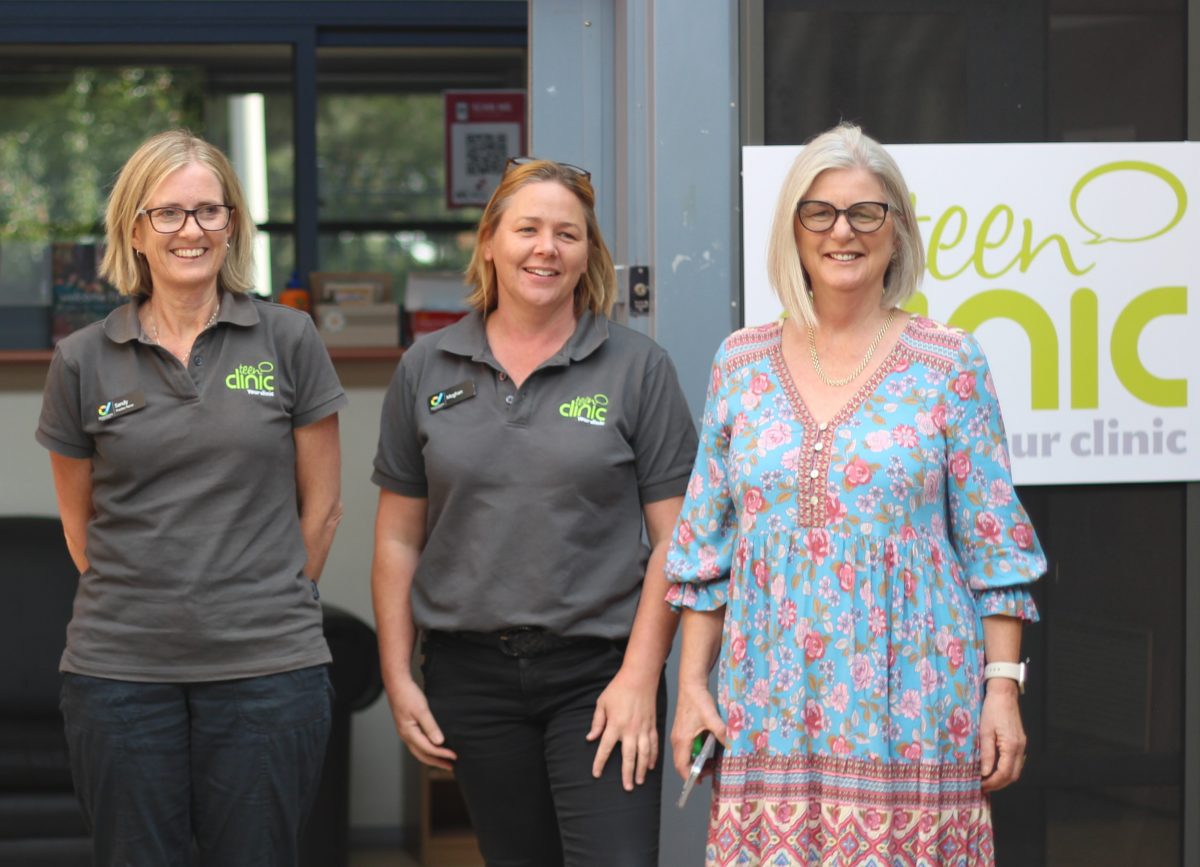
Teen Clinic advanced practice nurses Sandy Lendrum and Meghan Campbell, with Directions Health CEO Bronwyn Hendry.
Sandy says the clinic also provides reliable information, so kids are not taking their cue from social media.
But she has a word of warning for parents. Their involvement may only work with the consent of their children, especially if the children don’t believe they have a problem.
“We love to have parents come along, no problem at all, and we also would encourage kids to speak with their parents or their significant adults in their life,” she says.
“So parents are definitely very welcome. There are cases however, where having the parents around isn’t helpful.”
Only a couple of cases of family violence have presented and that falls into the mandatory reporting category.
But Sandy says having the backing of Directions Health, which has a lot of experience and knowledge, has been important. She also praises the role of schools and teachers in that space.
“They just do the most amazing stuff for kids, well beyond teaching them,” she says. “They really do have a great rapport with kids, which is what you need, and they are able to help them.”
Sandys says Canberra’s community-embedded Teen Clinic model is something she’d like to see more of across the city.
“I feel like it does point to these accessible user-friendly models that are within walking distance to colleges and schools,” she says.
“It’s so simple, and cheap to run because you’re using community resources.”
Directions Health director, service delivery, Stephanie Stephens also would like to see Teen Clinic become a permanent fixture and spread its wings.
“We’ve currently got term funding. But we’d very much like for it to be a mainstay, but we’d also like to have a teen clinic elsewhere as well,” she says.
“We certainly have put in for some funding. And we’ve had some fixed funding come through but that only goes part of the way. We’re still in need of additional ongoing funding for the program.”
Collaborative member and Snow Foundation CEO, Georgina Byron, says the focus on youth services was vital at this time of uncertainty and change.
“It’s so important that we have a true understanding of how the sector is doing, we need to know what worker burnout, and other factors, are having on the availability of youth services in the region,” she said.
“This is in addition to the development of new services, created with young people in mind, as we recover from COVID and begin to understand its true impact.”
Ms Byron said the physical and mental health of young people had taken a serious knock from three years of the pandemic.
“The uncertainty for young people associated with changes to just about every aspect of our lives must be taken seriously,” she said.
“We must find ways to provide young Canberrans with safe, caring, low or no cost, available health-based environments, where they feel it’s OK to share their physical and mental health worries and needs.”
Anyone experiencing distress can seek immediate advice and support through Lifeline (13 11 14), Kids Helpline (1800 55 1800), or the digital mental health gateway, Head to Health.
If you are concerned about suicide, living with someone considering suicide, or bereaved by suicide, the Suicide Call Back Service is available at 1300 659 467.












